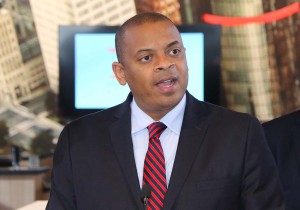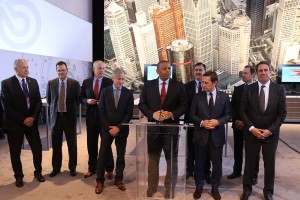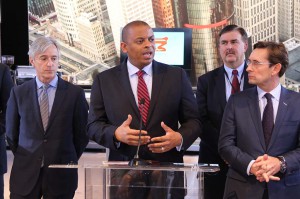As he wraps up his final year in office, President Barack Obama is calling for significant improvements in vehicle safety and will, among other things, seek $3.9 billion in funding for the development of connected car technology and automated vehicles, a senior administration official announced in Detroit today.
During a visit today to the North American International Auto Show on Thursday, U.S. Transportation Secretary Anthony Foxx outlined the new budget proposal as well as a number of broader steps the Department of Transportation plans to take to accelerate vehicle safety innovations.
“We are on the cusp of a new era in automotive technology with enormous potential to save lives, reduce greenhouse gas emissions, and transform mobility for the American people,” said Sec. Foxx, calling the new actions a “path forward for manufacturers, state officials and consumers to use new technologies and achieve their full safety potential.”
(A lot more Takata airbag recalls likely, NHTSA chief warns. Click Here for the latest.)
President Obama’s budget proposal for the 2017 fiscal year would provide nearly $4 billion for a 10-year pilot program to test what is expected to become a nationwide vehicle-to-infrastructure network and to press forward with vehicle-to-vehicle communications technology, known in the industry as V2V and V2I. Last year, Washington announced a pioneering connected-car system would be put in place covering 100 miles of Detroit-area highways.
Proponents contend such a system would alert motorists to weather and traffic problems and both improve traffic flow and reduce crashes.

"Automated vehicles open up the possibility of saving lives, saving time, saving fuel," Sec. Foxx said during his speech at the NAIAS.
The National Highway Traffic Safety Administration has laid out a plan that calls for a massive reduction in highway fatalities. About 32,000 Americans died in crashes in 2014, the latest year for which full data is available, but NHTSA Administrator Mark Rosekind this week said the goal is to bring that down to zero.
Key to getting there, safety experts content, will be the use of advanced technology, from automated emergency braking to fully autonomous vehicles. The emphasis is on overcoming driver errors which, Rosekind emphasized Thursday, is responsible for “94 percent of fatal crashes.”
Last May, Sec Foxx toured a facility operated by mega-supplier Delphi, one of the companies developing autonomous vehicle technology. He subsequently ordered NHTSA to identify obstacles to the development, testing and public roll-out of self-driving technologies.
“Automated vehicles open up the possibility for saving lives, saving time and saving fuel,” stressed the Secretary.
(Live from Detroit: Click Here for our complete Detroit Auto Show coverage.)
Among other things, Washington wants to make it possible to speed up testing on public roads. Currently, only a handful of states, including Nevada, Michigan, California and Florida, have enacted autonomous vehicles regulations and they are not necessarily consistent and compatible.
Thursday’s announcement calls for the agency to work with state regulators, the American Association of Motor Vehicle Administrators and other groups to develop a model state policy that would spur the development of autonomous vehicles. The guidelines are expected to be ready within six months.
“That’s a pretty quick turnaround” for a government agency, said John Krafcik, the CEO of Google’s autonomous vehicle program.
Sec. Foxx also said NHTSA will work with the industry to help clarify rules that could otherwise delay or block autonomous vehicle innovation. He noted how the agency moved quickly to approve an automated parking system developed by BMW that was originally out of compliance with federal rules. He called on automakers and suppliers to seek out similar approval rather than allow potential breakthroughs to be blocked by bureaucratic rules.
“We want to work to make progress and not hold it back,” the Secretary said.
After his speech, the DoT chief was asked about another potential roadblock to innovation: the country’s increasingly litigious nature. Many within the auto industry say they fear the possibility of becoming a deep-pocket target if anything goes wrong during testing.
“One way or the other, we will speak to that issue,” said the Secretary, whether in the form of rulemaking or, if necessary, by proposing new legislation.
The Thursday announcement is only the first in a series of events planned for the coming weeks that NHTSA Administrator Mark Rosekind is calling “historic.”
On Friday, he will return to the Detroit Auto Show to unveil a potentially precedent-setting industry government consortium that will include 16 major automakers as well as the government. The goal will be to promote the cooperate development of new safety technologies and get them onto the street years faster than might otherwise be possible through the traditional rule-making process.
“This is an unknown world,” said Mark Reuss, head of global product development for General Motors. “No one knows all the answers.”
Just months after the company was fined for delaying by a decade the recall of a defective ignition switch now blamed for over 100 fatalities, Reuss said it will be worth the effort and cost “if we save one life.”
Asked if this is a sea change in the way the industry is doing business, he answered simply, “Yes, it is.”
(SUV sales growing fast, automakers racing to catch up. Click Here for the story.)



Obama can go pond salt where the Sun don’t shine.